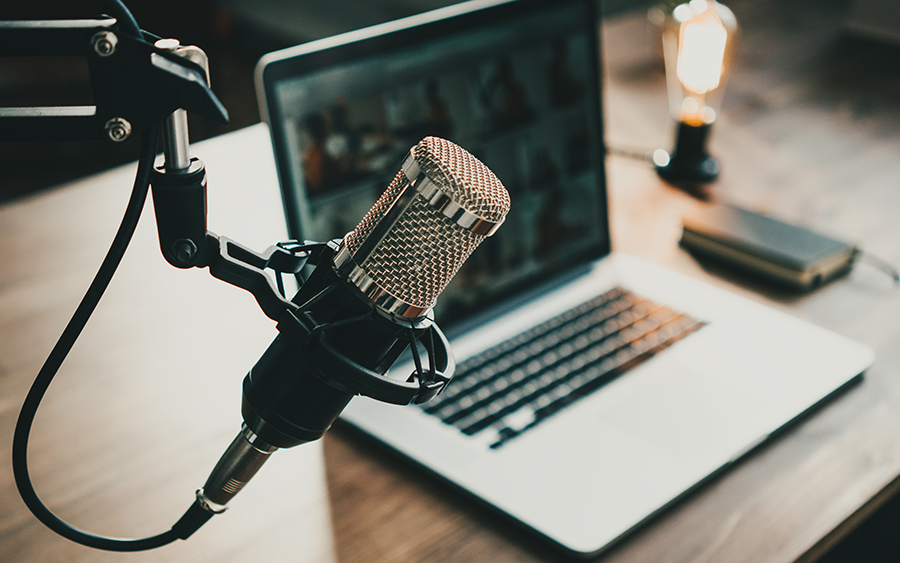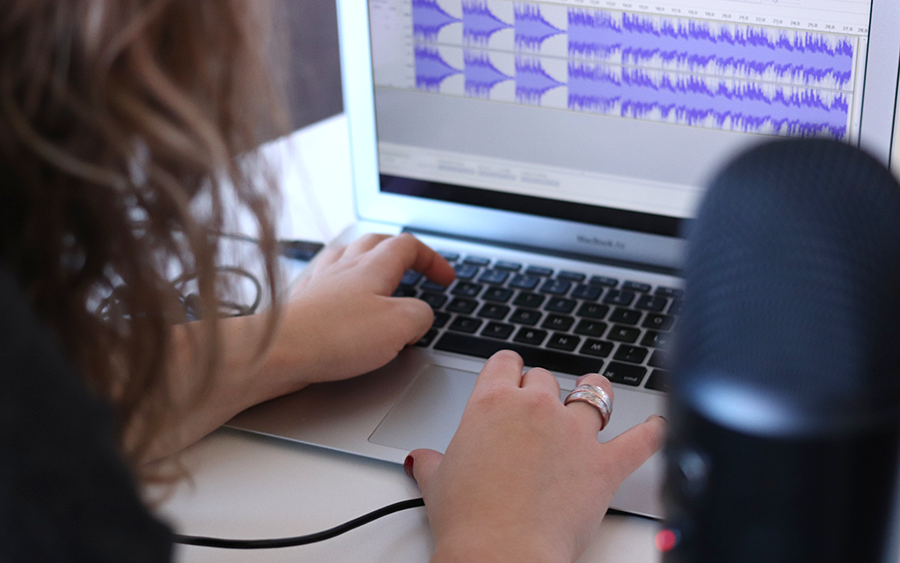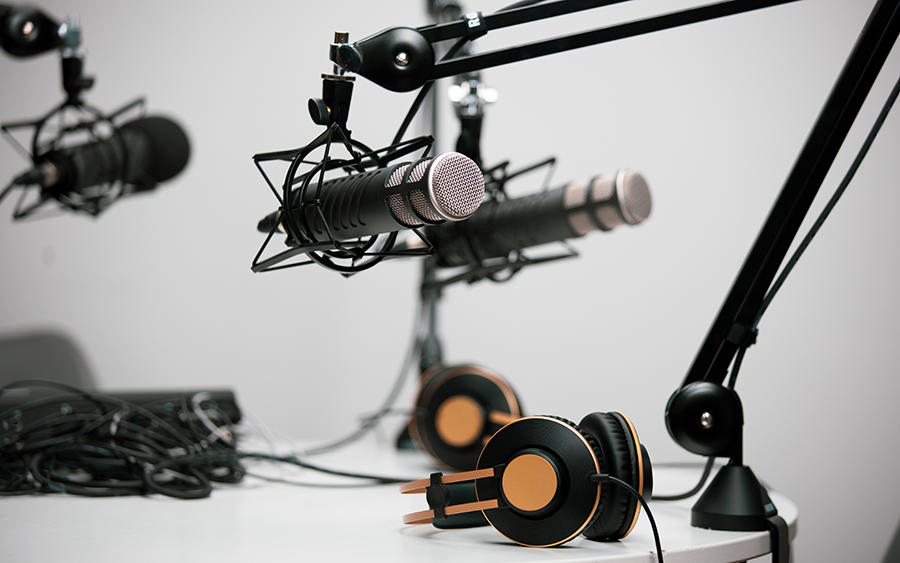
By: Ahmad Rashad, Founder and CEO of My Producer, LLC.
About Ahmad Rashad
I’m a radio guy and I’ve worked for several traditional radio stations in the Dallas Texas area. Now I’m a podcaster, producer, podcast coach, and director of Power 77 Radio.
I’m also the CEO and founder of myProducer. It’s an all-in-one podcast subscription business for novice podcasters. My team and I have made the podcast creation process easier, more affordable, and quicker. We have produced hundreds of episodes with over 50 thousand downloads.
I don’t consider myself an expert in the field. Instead, I simply view myself as a professional. I don’t consider myself an expert because I am always learning my craft. I tell clients to always be willing to listen and grow. Even if it’s something you’ve already heard, there’s always something you can learn, and it gives you the confidence that you are going in the right direction.

How is a Podcast Created?
There are a few things you need to get started podcasting
- Microphone
- Recording device
- Editing software
- Hosting platform
- Distribution platform.
Podcast Microphones
Most beginner podcasters will start with a USB microphone such as a Yeti plug and play system. These can work with most PCs or Laptops and are very simple to use.
Only a few podcasters I’ve met understand how to use an XLR mic such as a Shure SM7B. These types of microphones have a more complicated connection but can still be plugged into a PC or Laptop. A lot of beginners want to get to a level where they can utilize more advanced equipment but it is difficult without help. There is a gap in the marketplace for professional trainers. Beginners want to grow but are not looking to devote themselves to a full audio/video course like the Audio Video Production Program here at Laurus College.
Podcast Recording
Believe it or not, some podcasts are being recorded on a smartphone. I even have a podcaster I am producing called Life’s Journey with Angelina Patterson that is recording their podcast in a car.
About Life’s Journey with Angelina Patterson
Angelia Patterson just started. She has less than 20 episodes and one of them has over a thousand downloads. Her show is dedicated to those who enjoy documentaries so we produce her show in a documentary style rather than a more “talk show” style format. This production style allows her a lot of flexibility in where and when she records her show. She’s averaging about 1,400-1,500 downloads a month.

Audio Engineering
Podcasting is where the skillset of an audio engineer can come into play. There is an artform to manipulating sound and noise cancellation. We can minimize the car sound to a degree where the podcaster actually sounds like they are in an isolated booth. For this podcast specifically, we liked the authenticity of the podcast being set in a car, so we keep some of the car sounds. However, it is still important to make sure her voice is clear enough for the listener to hear the show.
A lot of beginners are recording with their mobile devices because it’s less expensive. Unfortunately, the quality is not good and they’re suffering. There are a little over 2 million podcasts in the ecosystem and about 40% of them are inactive. Most of those inactive podcasts are recorded on a phone. The quality is not great, they don’t sound great, and they give up in less than 10 episodes simply because they don’t have the training behind them.
So you can record on your mobile device if you have a great producer or audio engineer to manipulate the sound for you. This is a great space for Laurus College Audio Video students to fit into.
Podcasting Software
As far as software goes, most podcasters are using Audacity because it’s free and open source. The benefit is that podcasters can record easily, but the user interface is not that great. There are a lot of features that are missing that could be used to enhance your product.
Editing is a tedious process and it can take a year or more to get proficient. A lot of quality podcasters team up with someone who has studied sound engineering or someone on the team who works in the broadcast industry.
Podcasting Hosting & Distribution platforms
Hosting and distribution are not the same things. A podcast hosting platform stores your shows online and a distribution platform provides those shows to listeners. However, distribution is often done automatically. There are tons of distribution sites such as Apple, Spotify, Google, Amazon, etc. I’m sure if you listen to a podcast you’ve heard one on one of these platforms.
Libsyn, PodBean, and Stitcher are popular hosting sites for beginner podcasters. These sites will host all of your episodes and list them on distribution platforms. Libsyn is a paid service that helps you with monetization opportunities and social media promotion. PodBean and Stitcher are free services. Anchor.fm is another option that will both host and distribute podcasts and they also allow you to record and edit a podcast directly on their platform.

Podcasting and Social Media
Social media is all about fast-paced content consumption. Users scroll quickly through feeds and glance at individual posts. It can take a lot of content and time before users begin to engage with a content creator and gain that name recognition.
In addition, Social media sites are completely saturated with content creators. Everyone wants to get those likes. Plus, content on social media is easily forgettable even if that content is well made and even if the creator put hours of work into it.
Podcast Benefits
In contrast, podcasting is slow-paced content consumption. Podcasts engage listeners for 30 minutes or more. 70% of podcast listeners listen to 90% of the podcast. This is a much higher level of engagement than other content streams. The users are going to know who you are as a podcast content creator far more often than they might recognize you from Instagram or TikTok.
Algorithms are also on the Podcaster’s side. There is a fight between Apple, Google, Amazon, etc. They’re fighting for subscribers; they want subscribers and they dump a lot of money into advertising podcasts. This is great for podcasters because they are doing the work of boosting quality podcasts. A good podcast can outperform social media because of this algorithm.
Podcasting has a low saturation. There are more listeners than there are podcasts. There are a little over 2 million podcasts but 41% of Americans listen to a podcast on at least a monthly basis. That’s 116 million people. Podcasts are a great opportunity for someone to jump in now. It’s still considered low cost and something you can break into as podcasting grows in the marketplace. Podcasting is a billion-dollar industry now and it’s only growing.
Podcasting is much more memorable than social media and it gives you instant credibility. Similar to authors, podcast creators are automatically considered credible because of how much work goes into creating their products.
Using Social Media and Podcasting Together
Using social media alongside podcasting can help your business, your messaging, and your career.
Stronger Marketing Strategy. A Podcast can serve as an infomercial. You can use a podcast to talk about your product and drive traffic to your social media accounts. Then social media can handle sales inquiries and customer engagement.
Improves communication with your audience. Social media can give quick highlights on the topic and can serve as a great top-of-the-funnel sales engagement. Then, a podcast can provide in-depth information and move customers down the sales funnel. Because podcasts are slow-paced content consumption you can offer listeners more information and get them excited about your brand.
A faster way to make money. Podcast stats are viewed as more valuable than social media stats, but combining these stats is the way to go. By growing your audience on social media to 1,000 or more followers you can start to sell yourself as a micro-influencer. I have podcasters that monetize on the day they launch. Podcasts are still considered new and listeners still give podcasters the kind of credibility they give an author. You can start the selling process before you even launch your first episode.

Other Podcast Combinations
When I look at podcasts I like to think about all the ways they can be combined with other media.
Podcasts with Blogs.
If you combine a podcast with a blog you can create transcriptions of your episodes. Google and other search engines love transcriptions as long as they are accurate. It’s a great way to get your podcast ranking on search engines.
Podcasts with Websites.
It’s great you can have your podcast featured on IHeartRadio or Apple, but if you’re selling a product, or you have other content, a custom website can help you have a more permanent place on the internet. This allows you to have more control over where your content is and how it is presented to the public. Websites are a great way to grow traffic and keep visitors coming back.
Podcasts with E-mail.
The passive-aggressive method to stay in someone’s DM. Because podcasts are still new visitors are often more open to staying in contact. Email is a great way to keep that contact. There’s a lot of great reasons to have an email newsletter matched with your podcast.
Podcasts with SMS.
The open rate for text messages is over 90%. While there are a lot of regulations about text messages, it can be a great way to grow your podcast traffic with new listeners until you can transform them into an email newsletter.
The Power of Podcasting
Whether you are producing podcasts or seeking to start your own show, understanding the power of podcasting alongside social media is important for your sustainability. Producers and show hosts both must think like social media marketers. This is how we have to start thinking going forward so that we can maintain and stay relevant in the marketplace.
